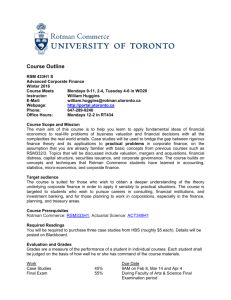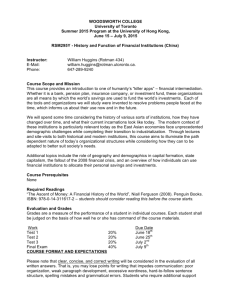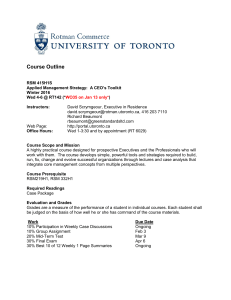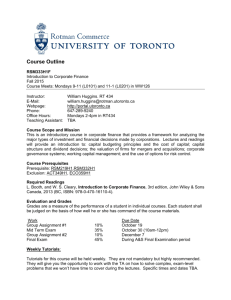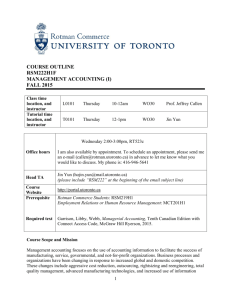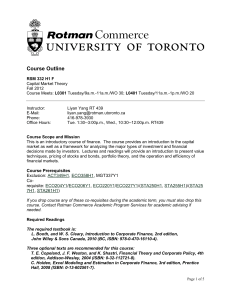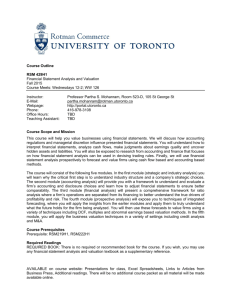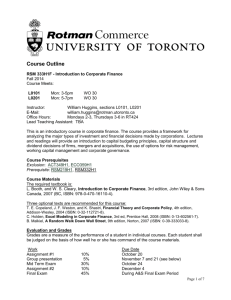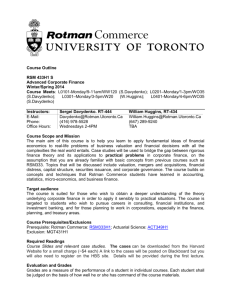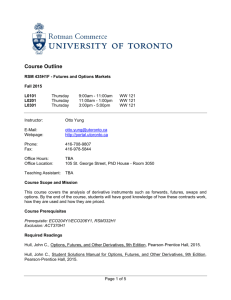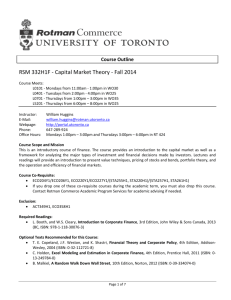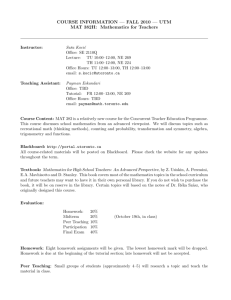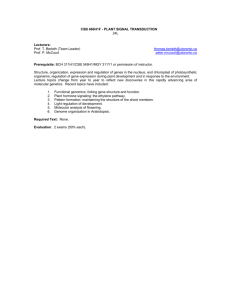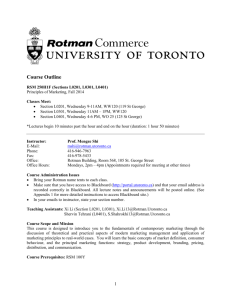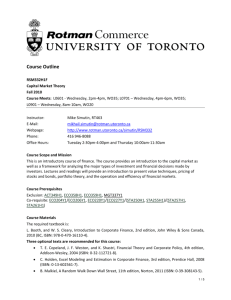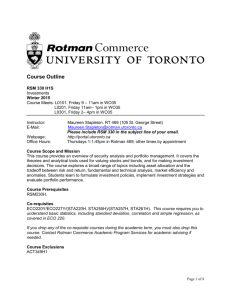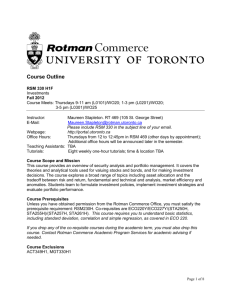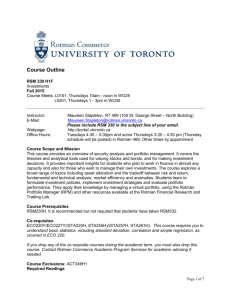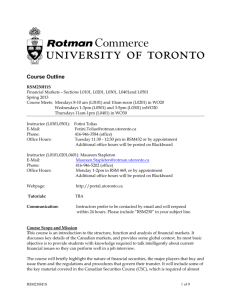Course Outline
advertisement
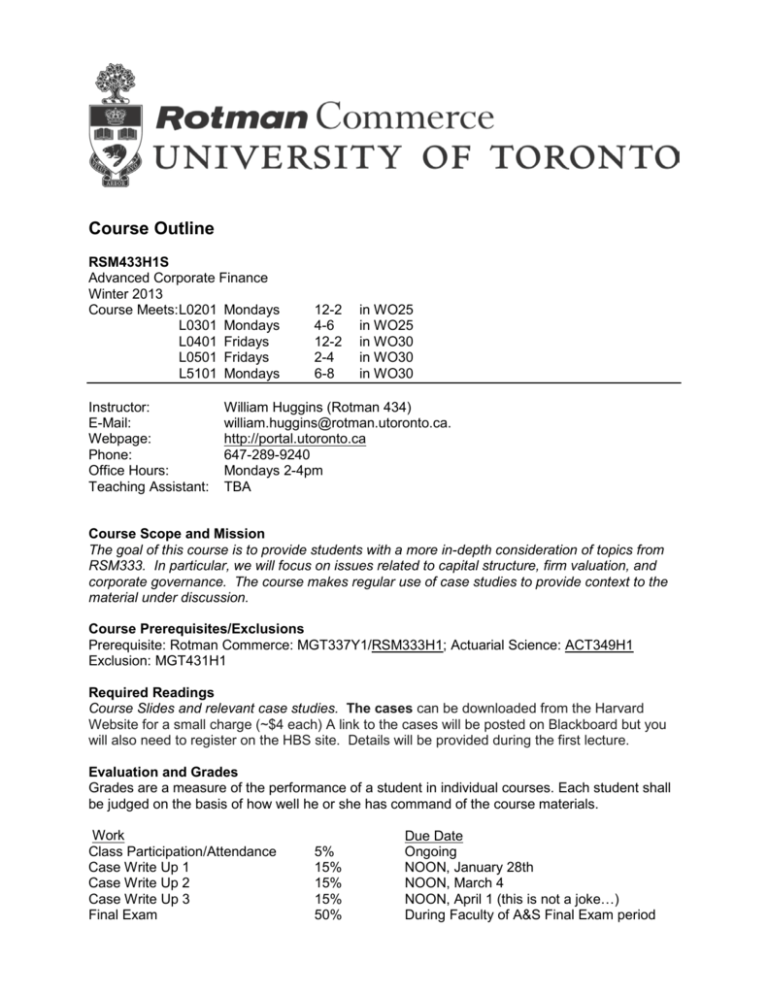
Course Outline RSM433H1S Advanced Corporate Finance Winter 2013 Course Meets: L0201 Mondays L0301 Mondays L0401 Fridays L0501 Fridays L5101 Mondays Instructor: E-Mail: Webpage: Phone: Office Hours: Teaching Assistant: 12-2 4-6 12-2 2-4 6-8 in WO25 in WO25 in WO30 in WO30 in WO30 William Huggins (Rotman 434) william.huggins@rotman.utoronto.ca. http://portal.utoronto.ca 647-289-9240 Mondays 2-4pm TBA Course Scope and Mission The goal of this course is to provide students with a more in-depth consideration of topics from RSM333. In particular, we will focus on issues related to capital structure, firm valuation, and corporate governance. The course makes regular use of case studies to provide context to the material under discussion. Course Prerequisites/Exclusions Prerequisite: Rotman Commerce: MGT337Y1/RSM333H1; Actuarial Science: ACT349H1 Exclusion: MGT431H1 Required Readings Course Slides and relevant case studies. The cases can be downloaded from the Harvard Website for a small charge (~$4 each) A link to the cases will be posted on Blackboard but you will also need to register on the HBS site. Details will be provided during the first lecture. Evaluation and Grades Grades are a measure of the performance of a student in individual courses. Each student shall be judged on the basis of how well he or she has command of the course materials. Work Class Participation/Attendance Case Write Up 1 Case Write Up 2 Case Write Up 3 Final Exam 5% 15% 15% 15% 50% Due Date Ongoing NOON, January 28th NOON, March 4 NOON, April 1 (this is not a joke…) During Faculty of A&S Final Exam period COURSE FORMAT AND EXPECTATIONS Normally students will be required to submit their course case reports to Turnitin.com for a review of textual similarity and detection of possible plagiarism. In doing so, students will allow their reports to be included as source documents in the Turnitin.com reference database, where they will be used solely for the purpose of detecting plagiarism. The terms that apply to the university’s use of the Turnitin.com service are described on the Turnitin.com website. Please note that clear, concise, and correct writing will be considered in the evaluation of all case write ups. That is, you may lose points for writing that impedes communication: poor organization, weak paragraph development, excessive wordiness, hard-to-follow sentence structure, spelling mistakes and grammatical errors. Students who require additional support and/or tutoring with respect to their writing skills are encouraged to visit the Academic Success Centre (www.asc.utoronto.ca) or one of the College Writing Centres (www.writing.utoronto.ca/writing-centres). These centres are teaching facilities – not editing services, where trained staff can assist students in developing their academic writing skills. There is no charge for the instruction and support. Case write-ups requires students to work in teams of 3-4. No one should work alone or in pairs. Learning to work together in teams is an important aspect of your education and preparation for your future careers. That said, project-based teamwork is often new to students and you are therefore reminded of the following expectations with respect to behaviour and contributions to your team project. 1. Read the document entitled, “Working in Teams: Guidelines for Rotman Commerce Students” which is available on the RC portal under the Academic Services tab. 2. When working in a team, Rotman Commerce students are expected to: • • • • • Treat other members with courtesy and respect; Honour the ground rules established by the team; Contribute substantially and proportionally to the final project; Ensure enough familiarity with the entire contents of the group project/assignment so as to be able to sign off on it as original work; Meet the project timeline as established by the team. 3. Resolving differences: Conflicts can – and do – occur. Conflicts are part of the team’s process of learning how to work together effectively and can actually generate exciting debate and creative solutions – if managed appropriately. Student teams are collectively expected to resolve disputes or misunderstandings as soon as they arise (and prior to submission of the final project). In cases where teams are unable to reach a mutually agreeable solution, the entire team must meet with the Rotman Commerce Team Coach** as soon as possible. The Coach will listen to the team and help develop options for improving the team process. All members of the project team must commit to, and, utilize their action plans. ** The Rotman Commerce Team Coach, Nikoleta Vlamis, may be reached at nikoleta@nikoletaandassociates.com for an appointment. Nikoleta is an expert in team dynamics and facilitation. Note that Nikoleta’s role is to provide guidance, support and advice on team matters – not to formally evaluate or assess teamwork for academic purposes. Weekly Schedule Session Date Topic Readings 1 Jan 7 and 11 Course Introduction How to approach case studies 2 Jan 14 and 18 Raising Capital IPOs, SEOs, Dilution Case for discussion TBA 3 Jan 21 and 25 Short vs. Long-term Debt Covenants, Ratings, Public v Private Case for discussion TBA 4 Jan 28 and Feb 1 Advanced Capital Structure Signaling, Imperfect Information, Empirics Case for discussion TBA 5 Feb 4 and 8 6 Feb 11 and 15 7 Feb 25 and Mar 1 Mergers and Acquisitions 8 Mar 4 and 8 9 Mar 11 and 15 Distress and Bankruptcy Re-organization, Liquidation Case for discussion TBA 10 Mar 18 and 22 Corporate Governance Compensation, Directors, Activism Case for discussion TBA 11 Mar 25 and 29 12 April 1 and 5 Discussion of Case Write-up #1 Valuation Ratios, DCFs, Private firms Valuation, Synergies Final Exam TBA by FAS Case for discussion TBA Case for discussion TBA Discussion of Case Write-up #2 NO CLASS Discussion of Case Write-up #3 POLICIES AND PROCEDURES Late Assignments Since the cases to be turned in will form the basis of classroom discussion the week (day) they are due, late assignments will not be accepted for any reason. If you fall ill, make sure your group members are able to turn in your document on time. If you are all sick on the due date, contact me about a digital submission (same deadline – noon) Accessibility Needs The University of Toronto is committed to accessibility. If you require accommodations for a disability, or have any accessibility concerns about the course, the classroom or course materials, please contact Accessibility Services as soon as possible: disability.services@utoronto.ca or http://www.accessibility.utoronto.ca/. Academic Integrity Academic Integrity is a fundamental value essential to the pursuit of learning and scholarships at the University of Toronto. Participating honestly, respectively, responsibly, and fairly in this academic community ensures that the UofT degree that you earn will continue to be valued and respected as a true signifier of a student's individual work and academic achievement. As a result, the University treats cases of academic misconduct very seriously. The University of Toronto’s Code of Behaviour on Academic Matters http://www.governingcouncil.utoronto.ca/policies/behaveac.htm outlines the behaviours that constitute academic misconduct, the process for addressing academic offences, and the penalties that may be imposed. You are expected to be familiar with the contents of this document. Potential offences include, but are not limited to: In papers and assignments: • Using someone else's ideas or words without appropriate acknowledgement. • Submitting your own work in more than one course without the permission of the instructor. • Making up sources or facts. • Obtaining or providing unauthorized assistance on any assignment (this includes collaborating with others on assignments that are supposed to be completed individually). On test and exams: • Using or possessing any unauthorized aid, including a cell phone. • Looking at someone else's answers • Misrepresenting your identity. • Submitting an altered test for re-grading. Misrepresentation: • Falsifying institutional documents or grades. • Falsifying or altering any documentation required by the University, including (but not limited to), medical notes. All suspected cases of academic dishonesty will be investigated by the following procedures outlined in the Code of Behaviour on Academic Matters. If you have any question about what is or is not permitted in the course, please do not hesitate to contact the course instructor. If you have any questions about appropriate research and citation methods, you are expected to seek out additional information from the instructor or other UofT resources such as College Writing Centres or the Academic Success Centre. Email At times, the course instructor may decide to communicate important course information by email. As such, all UofT students are required to have a valid UTmail+ email address. You are responsible for ensuring that your UTmail+ email address is set up AND properly entered on the ROSI system. For more information please visit http://help.ic.utoronto.ca/category/3/utmail.html Forwarding your utoronto.ca email to a Hotmail, Gmail, Yahoo or other type of email account is not advisable. In some cases, messages from utoronto.ca addresses sent to Hotmail, Gmail or Yahoo accounts are filtered as junk mail, which means that important messages from your course instructor may end up in your spam or junk mail folder. Blackboard and the Course Page The online course page for this course is accessed through Blackboard. To access the course page, go to the UofT Portal login at https://portal.utoronto.ca/ and log in using your UTORid and password. Once you have logged in, look for the My Courses module where you’ll find the link to all your course websites. If you don’t see the course listed here but you are properly registered for the course in ROSI, wait 48 hours. If the course does not appear, go to the Information Commons Help Desk in Robarts Library, 1st floor, for help, or explore the Portal Information and Help at www.portalinfo.utoronto.ca/students and review the Frequently Asked Questions. Recording Lectures Lectures and course materials prepared by the instructor are considered by the University to be an instructor’s intellectual property covered by the Canadian Copyright Act. Students wishing to record a lecture or other course material in any way are required to ask the instructor’s explicit permission, and may not do so unless permission is granted (note: students who have been previously granted permission to record lectures as an accommodation for a disability are, of course, excepted). This includes tape recording, filming, photographing PowerPoint slides, Blackboard materials, etc. If permission is granted by the instructor (or via Accessibility Services), it is intended for the individual student’s own study purposes and does not include permission to “publish” them in anyway. It is absolutely forbidden for a student to publish an instructor’s notes to a website or sell them in any other form without formal permission.
